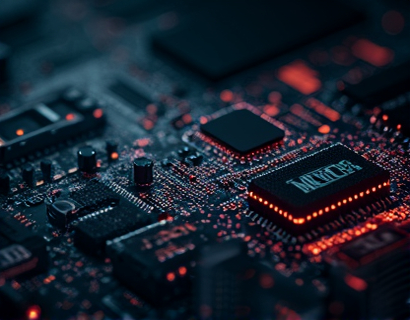Smart Contract Automation: Revolutionizing Business Payments and Financial Obligations
In the rapidly evolving landscape of financial technology, smart contract automation stands out as a transformative force, particularly in the realm of business payments and financial obligations. This technology harnesses the power of blockchain to automate and streamline various financial processes, offering unprecedented levels of security, transparency, and efficiency. By leveraging smart contracts, businesses can significantly enhance their financial management, reducing manual errors and operational costs while ensuring compliance and trust in transactions.
Understanding Smart Contracts
Smart contracts are self-executing contracts with the terms of the agreement directly written into code. They run on a blockchain network, which is a decentralized and distributed digital ledger that records transactions across multiple computers. This ensures that once a smart contract is deployed, it automatically executes, controls, or documents legally binding actions based on predefined conditions. The use of smart contracts in financial management is particularly advantageous because they eliminate the need for intermediaries, such as banks or legal entities, thereby reducing costs and increasing speed.
Automating Dividend Distribution
One of the most impactful applications of smart contract automation is in the distribution of dividends. Traditional dividend payouts involve multiple steps, including calculation, approval, and disbursement, which can be time-consuming and prone to errors. With smart contracts, these processes are automated and executed instantly when predefined conditions are met. For instance, once the company's board approves the dividend amount and the shareholders meet the holding period requirement, the smart contract automatically calculates the dividend for each shareholder and transfers the funds to their designated wallets. This not only speeds up the process but also minimizes the risk of human error and fraud.
Enhancing Earnings Payments
Similarly, smart contracts can revolutionize the payment of earnings, such as salaries and bonuses. In traditional payroll systems, employees receive their payments after a series of manual calculations, approvals, and transfers, which can delay the payment process and increase administrative burdens. Smart contracts can automate these steps by linking employee records to the contract, ensuring that payments are made automatically and accurately based on the agreed-upon terms. This real-time payment capability not only improves employee satisfaction but also reduces the financial department's workload, allowing them to focus on more strategic tasks.
Streamlining Scheduled Payments
Scheduled payments, such as rent, utilities, and loan installments, are another area where smart contract automation shines. These payments often require precise timing and can be cumbersome to manage manually. Smart contracts can be programmed to trigger payments at specific intervals, ensuring that bills are paid on time without the need for constant monitoring. This automation not only ensures timely payments but also helps in maintaining a positive credit score by avoiding late payments. Moreover, it reduces the risk of overspending or underspending by adhering strictly to the predefined terms.
Ensuring Security and Transparency
Security and transparency are paramount in financial transactions, and smart contracts excel in both areas. The immutable nature of blockchain ensures that once a transaction is recorded, it cannot be altered or deleted, providing a tamper-proof record. This level of security is particularly crucial for financial obligations, where the integrity of transactions is essential. Additionally, all transactions on a blockchain are visible to all parties involved, enhancing transparency and trust. This visibility allows stakeholders to verify the status of payments and other financial obligations in real-time, reducing disputes and increasing confidence in the system.
Reducing Operational Costs
The automation of financial processes through smart contracts significantly reduces operational costs associated with traditional methods. By eliminating the need for intermediaries, businesses can save on fees charged by banks, payment processors, and other financial institutions. Moreover, the reduction in manual labor and administrative tasks leads to lower operational expenses. This cost savings can be substantial, especially for large organizations that handle a high volume of transactions daily. The efficiency gains also translate into faster processing times, allowing businesses to allocate resources more effectively and improve overall productivity.
Improving Compliance and Regulatory Adherence
Compliance with financial regulations is a critical aspect of business operations, and smart contracts can play a vital role in ensuring adherence. Smart contracts can be programmed to include compliance checks, automatically verifying that all transactions meet regulatory requirements before execution. This built-in compliance feature helps businesses avoid costly penalties and legal issues arising from non-compliance. For instance, in cross-border payments, smart contracts can ensure that all necessary taxes and fees are accounted for, and that transactions comply with international financial regulations. This not only streamlines the process but also provides a robust audit trail, making it easier to demonstrate compliance to regulators.
Enhancing Financial Control and Visibility
Smart contract automation provides businesses with enhanced financial control and visibility. By automating financial processes, businesses gain real-time insights into their financial status, including payments, obligations, and cash flow. This visibility allows for better financial planning and decision-making, as businesses can quickly identify areas where costs can be reduced or revenues can be increased. Additionally, the transparency provided by blockchain ensures that all financial transactions are recorded accurately and consistently, reducing the risk of discrepancies and errors. This level of control and visibility is invaluable for businesses looking to optimize their financial operations and maintain a competitive edge.
Case Studies and Real-World Applications
Several companies across various industries have already begun to leverage smart contract automation for their financial processes. For example, a major multinational corporation implemented smart contracts to automate its global payroll system. By doing so, they reduced payroll processing time by 70% and eliminated manual errors that previously cost them thousands of dollars in corrections. Another financial services firm used smart contracts to automate the distribution of investment returns, ensuring that investors received their shares instantly and securely, thereby enhancing customer satisfaction and reducing operational costs.
Challenges and Considerations
While the benefits of smart contract automation are clear, there are several challenges and considerations that businesses should be aware of. One of the primary challenges is the technical complexity of implementing smart contracts. Businesses need to have a solid understanding of blockchain technology and programming to develop and deploy effective smart contracts. Additionally, the interoperability of different blockchain platforms can be a hurdle, as businesses may need to integrate smart contracts across multiple systems. Security remains a concern as well, despite the inherent security of blockchain, as smart contracts can still be vulnerable to coding errors or exploits if not properly audited and tested.
Future Trends and Innovations
The future of smart contract automation in financial management is promising, with ongoing innovations set to further enhance its capabilities. One area of development is the integration of artificial intelligence (AI) with smart contracts, enabling more sophisticated decision-making and predictive analytics. This could lead to smarter financial management systems that not only automate transactions but also provide insights and recommendations based on real-time data. Additionally, the rise of decentralized finance (DeFi) platforms is expanding the use cases for smart contracts, offering new opportunities for financial inclusion and innovation. As the technology matures and becomes more accessible, we can expect to see even more widespread adoption across various industries.
Conclusion
Smart contract automation represents a significant leap forward in financial management, offering businesses a powerful tool to streamline payments, enhance security, and improve efficiency. By automating financial obligations, businesses can reduce costs, minimize errors, and gain greater control over their financial processes. As the technology continues to evolve, the potential benefits will only grow, making smart contract automation an essential consideration for any business looking to stay ahead in the digital age.











































